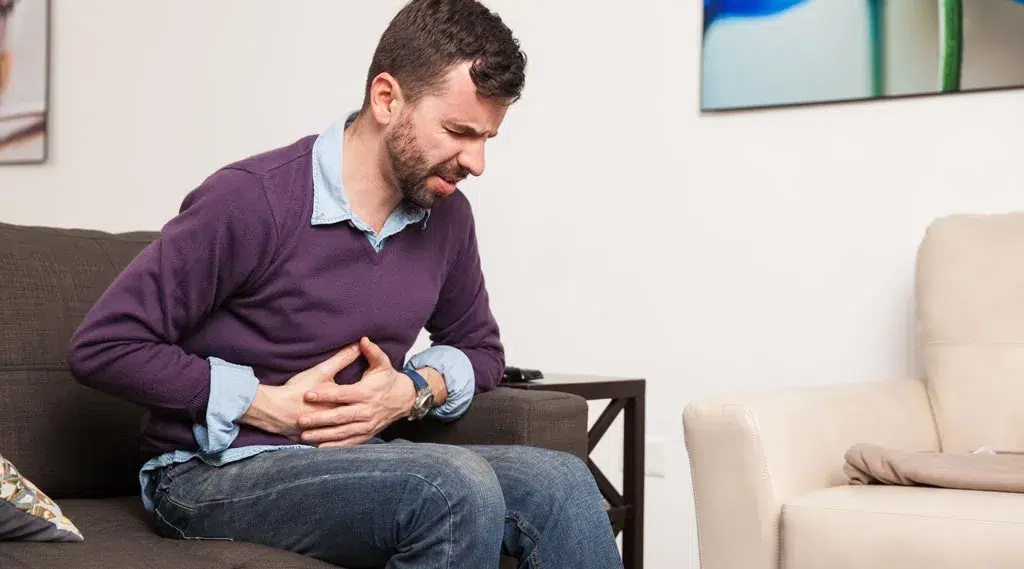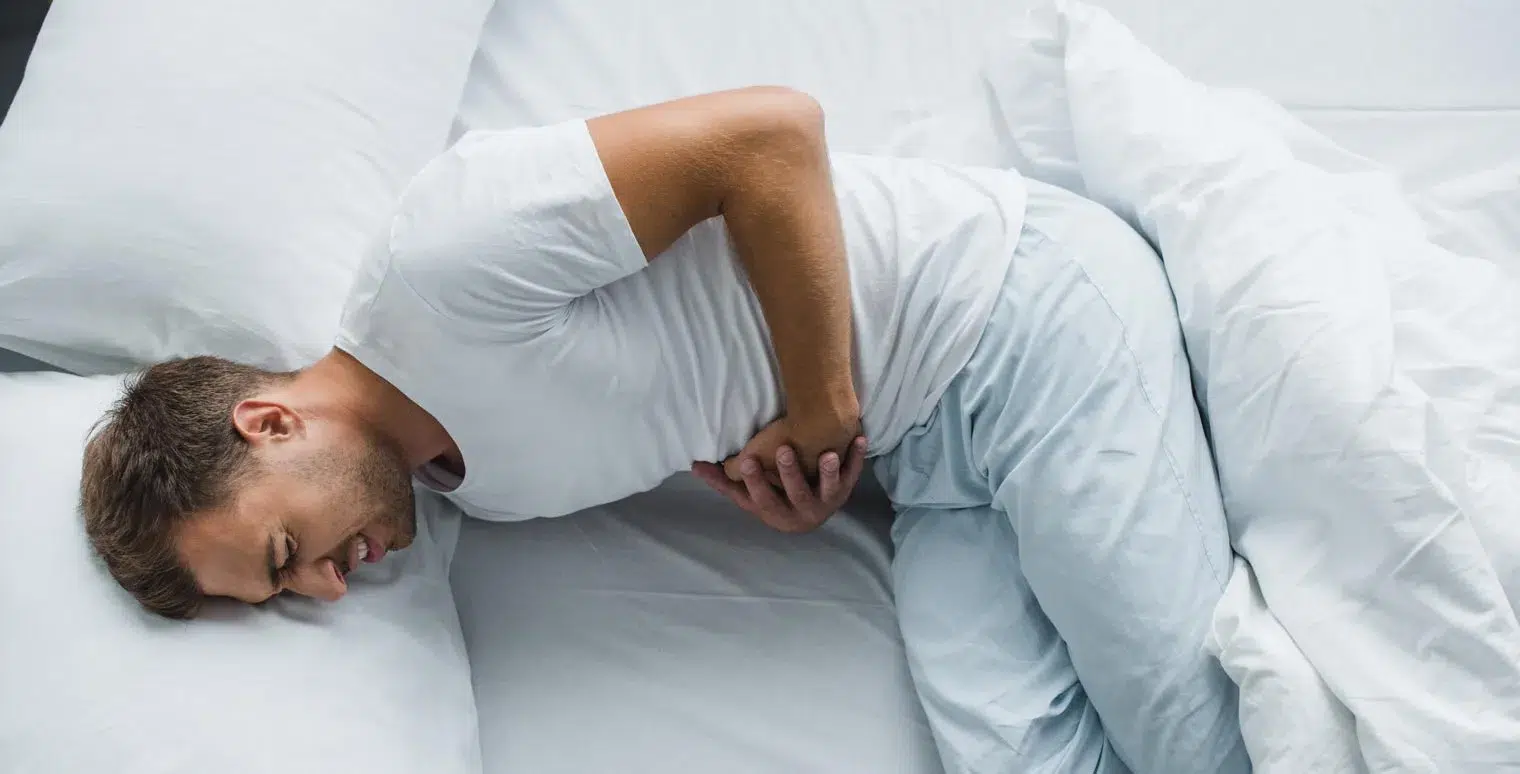
Anxiety Stomach Pain
How the Digestive System is Impacted by Anxiety
Table of Contents
For many people who struggle with serious anxiety, it impacts their physical health as well as their mental health. Stomach pain is one of the most prominent manifestations of anxiety in the body. It can range from an upset stomach to serious gastrointestinal upset like irritable bowel syndrome. How does anxiety stomach pain happen?
At Emerald Isle Health and Recovery, we take the whole person into account when devising treatment plans. If you have serious stomach discomfort and uncomfortable anxiety, we can help you get to the root cause, so keep reading and learn more about easing your discomfort now!
Confidential Mental Health Assessment
How Anxiety-Related Stomach Pain Impacts Digestive Health
Anxiety is a mental health condition, but it can make itself known through physical symptoms as well. A so-called “nervous stomach” is one way that anxiety can manifest itself in the body. While many people are familiar with butterflies when nervous, this type of anxiety stomach pain is a little different.
Stress hormones can impact how your digestive tract functions. Chronic stress, as is often the case for those with serious anxiety, can have a long-term impact on your stomach. Here is what you need to know about stomach discomfort that stems from an anxiety disorder.
How Cortisol and Stress Hormones Affect the Stomach

If you struggle to manage stress, you may find that you have a serious case of nervous stomach symptoms. Oftentimes, this is triggered by stress hormones like cortisol which can influence the way the stomach and intestines process food.
Many people do not yet understand the connection between mental health and gut health, but this is a prime example. The enteric nervous system is responsible for the brain-gut connection. As a result of this communication between the two systems, you may start to experience physical manifestations of your mental processes.
Gut Motility and Stomach Pains
One of the earliest nervous stomach symptoms is a direct impact on gut motility. In other words, anxiety stomach pain often stems from the way that the stomach or intestines process food. Namely, it impacts how they squeeze it and move food through the digestive system until it is absorbed or exits the body.
Leaky Gut and Chronic Stomach Pain
Some people find that they have a condition known as leaky gut which can stem from prolonged exposure to stress and anxiety. In this condition, the permeability of the intestines increases and allows more of your food to pass through the intestinal wall. The result of leaky gut syndrome is a chronic inflammation that can lead to what many people perceive as stomach pain.
Microbiome and Mental Health
Another sign of anxiety-induced digestive issues relates to the flora in the microbiome of the gut. The digestive tract is regulated by microbiota, and it turns out that these bacteria can be linked to mental health. If you are experiencing indigestion, stomach cramps, or other symptoms of a digestive problem, it could be the result of a disrupted microbiome in the gut.
Changing Diet with Stress
Of course, stomach pain could easily be the result of a change in your diet. Many people will change their diet when they start to feel overwhelmed. Perhaps the best case for this is the way people tend to turn to “comfort food” when they feel stress and anxiety. They may eat foods that they would not ordinarily eat.
Also, they could eat either more or less than usual, both of which can impact stomach pain.
If you take note of horrible stomach pain, sometimes the first logical place to start is your overall diet. Write down what you eat and see if you are consuming more or less than usual. You may be able to stop anxiety stomach pain with this one simple exercise. However, prolonged exposure to stress and anxiety can still cause other issues that lead to pain and discomfort.
Worsening of GI Disorders with Chronic Stress
If you are already predisposed to gastrointestinal disorders like irritable bowel syndrome (IBS), you might find that symptoms worsen when anxiety spikes. Inflammatory bowel disease and IBS can be extremely uncomfortable and even prevent you from living your day-to-day life.
These conditions may be treated with medication or a change in diet. If you suspect that they are worsened by a spike in your anxiety, then you may want to first seek treatment for your mental health concerns. Sometimes, this can correct anxiety-related stomach pain right at the source.
Identifying the Difference Between Anxiety-Related Stomach Issues and a Health Problem

Sometimes, it can be difficult to determine if your stomach pain is the result of an underlying anxiety issue or a physical condition. If you are experiencing more than just GI symptoms, you might consider consulting with your primary care physician.
Some signs of a serious gastrointestinal issue can include major weight loss, issues with bowel movements, and even blood in your stool. You should also consult with your doctor to ensure that you do not have any other issues, such as making sure that your issues are not an ulcer. Intestinal discomfort can come from many sources, so teasing out the root cause can be a challenge.
On the other hand, an absence of some of these symptoms may be a sign that your gut-brain axis is influencing your discomfort. Take note of whether you are experiencing any other symptoms of anxiety above and beyond your stomach pain.
Common signs of anxiety can include:
- Constantly feeling on edge or restless
- Challenges with concentration
- Irritability
- Exhaustion
- Difficulty falling asleep or staying asleep
- Inability to control worry
- Panic attack
if you are under chronic or acute stress or are experiencing any of the symptoms above, then you may want to consult with a mental health professional first. While a primary care physician can do their best to keep you comfortable, you might find that a clinician trained in anxiety can do more for your long-term health.
24 Hour Mental Health Hotline
Managing the Stress Response with Therapy and Medication
If your enteric nervous system is communicating feelings of stress to your stomach and GI tract, then it might be time to consider treating your anxiety symptoms. Even if you never have a full-blown panic attack, you can still experience issues with your anxiety.
You can try simple exercises like deep breathing, but you might do better with a more comprehensive treatment approach. There are many ways to resolve the issue of gut stress that leads to anxiety stomach pain. If you are serious about putting this pain behind you, you need to consider adopting a robust treatment plan that takes your mental and physical health into account.
At Emerald Isle Health and Recovery, we offer a variety of mental health treatment modalities to help you conquer your anxiety.
Cognitive Behavioral Therapy to Address Anxiety

One of the most effective treatments for anxiety issues is cognitive behavioral therapy (CBT). Compared to a placebo treatment, a review of the literature on CBT for anxiety shows that it has a positive effect on outcomes.
If you want to get your stress response under control, it might be a good idea to look for clinicians (like those found at Emerald Isle) who are skilled in this treatment. Not all clinicians will have this specialty, but it can be highly effective for the physical symptoms of anxiety.
CBT takes a look at how your thoughts and feelings impact your actions. If you are able to interrupt the cycle between your thoughts and feelings, you might find that your actions change. This could be beneficial for those who notice a change in their diet (overeating for comfort, for example) that leads to stomach pain.
It can also help you to address the root of what can cause stomach pain. If you know how to treat your anxiety, you might be able to lower your cortisol and stress hormone levels, resulting in less reflux, upset stomach, discomfort, and more.
Dialectical Behavior Therapy Skills to Cope with Daily Stressors
Even if the issue is not related to a change in diet, you might do well with learning some of the foundational skills involved in dialectical behavior therapy (DBT). Skills like deep breathing are often encompassed in DBT because they can help you to tolerate the distress of the moment.
The idea is that you will learn to sit with uncomfortable feelings and even learn to tolerate them. You can experience the same feelings but without the added pressure of needing to act on them. To this end, it can be helpful for those who overeat or under-eat as a means of coping with their stress.
You may even be able to help manage other symptoms of stress with this technique, such as high blood pressure. Dialectical behavior therapy will give you plenty of great coping skills to be more mindful of your anxiety and help you to soothe yourself when you need to.
In one research study, clinicians looked at how DBT skills compared with anti-anxiety medications. They found that dyspepsia (the technical term for indigestion) could be relieved by a DBT treatment program compared to medication for both anxiety and indigestion itself.
This proves that DBT is a great thing to explore before moving on to the next option – medication for your condition and discomfort.
Prescription Medication to Assist with Symptoms of Anxiety

The approach of using prescription medications to combat your stomach pain is two-fold. First, you might use medication to treat the underlying anxiety issue that causes your stomach pain. If you struggle with panic attacks or just general stress and anxiety, you might need to consider whether pharmaceuticals could help.
The right prescription for your persistent anxiety could result in fewer stress hormones flooding the body and limit stomach pain, gastroesophageal reflux disease, and more.
Prescription Medications for GI Issues
On the other hand, you might need medication to calm your gastrointestinal tract while you pursue treatment for your anxiety. Your doctor can prescribe something to make you more comfortable until you can get your central nervous system under control.
If you have an issue with your bowels such as IBS, medication could be a crucial piece of your treatment plan. Getting anxiety under control can help, but you may still need a prescription to improve symptoms.
This is why clear communication between all of the members of your treatment team is a necessity. A primary care physician may consider prescribing something that conflicts with what your mental health team decides to offer. Make sure that all parties involved in your treatment are on the same page prior to taking any prescriptions that could impact your treatment.
Immediate Placement for Mental Health Treatment
Getting to the Cause of Anxiety-Related Stomach Pain at Emerald Isle
If you want to know whether your anxiety could cause stomach pain, then you have come to the right spot. Emerald Isle Health and Recovery can help you to sift through the root issue that is causing you discomfort. If you struggle with high levels of stress or resonate with the list of anxiety symptoms presented here, it might be time to seek professional help.
Our team of skilled clinicians can help you with managing stress in a number of helpful ways. From inpatient treatment to outpatient treatment, we can work with your primary care physician to ensure that you live a healthy and comfortable life free from digestive issues.
Reach out to us today to learn more about how we can help you treat your anxiety!








